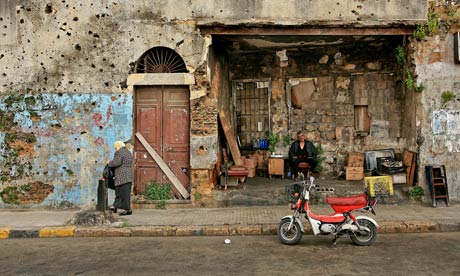The thousands killed during the civil war are forgotten as politicians exploit the tribunals and courts for their own ends

Odette Salem had prepared lunch for her 22-year-old son, Richard, and her daughter, Marie-Christine, who was 19. The meals were ready and hot, while the salad was yet to be mixed with olive oil to give the fresh taste her son and daughter liked.
But they never came back for lunch. In 1985, in war-ravaged West Beirut, Odette Salem never saw her children again. Trying to discover what happened to them – and thousands of other Lebanese civilians – occupied the rest of Odette's life.
In May last year, she died while crossing the street from her sit-in tent in downtown Beirut. Her death at 78 brought an end to a life of activism in seeking the truth for "the missing victims" whose numbers are estimated at between 5,000 and 17,000.
The truth was bound for eternal oblivion in Lebanon, where the war ended in an internationally blessed power-sharing agreement and an amnesty for all the terrible crimes committed during more than 15 years of bloody conflict. Justice for the 150,000 dead (about 5% of the country's population) was never mentioned, while the very same warlords who had masterminded many of the mass murders and atrocities shared the government under Syrian auspices (with Saudi blessing).
Today, two decades after Lebanon's civil war, justice and truth are the two dominant words in the political scene; unfortunately for the victims, they both became political tools in the country's proxy war: the American-Iranian showdown.
Unlike other international tribunals, like the ICTY in former Yugoslavia, the special court for Sierra Leone or the international criminal tribunal for Rwanda, all looking at mass atrocities, the special tribunal for Lebanon (STL) was set up to prosecute the killers of one person, Rafik Hariri, the former prime minister, and those who perished with him in a central Beirut explosion in February 2005.
But why give justice for one man and deny it to thousands?
Regardless of Hariri's controversial postwar reconstruction and corruption legacy, the tribunal owed its existence to two primary factors.
First, the assassination's critical timing. Two years after the US-led invasion of Iraq, regime change was still on the table and the Bush administration's neocons were longing for revenge against Syria's backing of Iraq's brutal insurgency.
Hariri's international connections also played a significant role, especially his Saudi ties and his friendship with the French president at the time, Jacques Chirac. The latter, who at the end of his term moved from the presidential palace into the Hariri family's Paris flat, was the first to call for an international investigation, and he forged an alliance with the United States to support the tribunal's establishment through a security council resolution.
More recently, one of the special tribunal's leading and most persistent advocates is Samir Geagea, a militia leader turned politician. Geagea, the Lebanese Forces leader, who is explicitly a US ally, was indicted in the assassination of the acting prime minister Rashid Karami in 1987 and the murder of his political rival, Christian leader Dani Chamoun, along with his wife and two sons in 1990; he served 11 years in prison, then was released after the newly elected parliament passed another amnesty law in 2005. These two crimes are listed on the tribunal's website as "relevant Lebanese case law" – the same tribunal that Geagea is currently fighting for. In a shocking quirk of fate, Geagea secured for his party two ministries in the latest national unity government (2009), among them the justice ministry.
In another blow to justice, Lebanon's justice council, a special court, set a date (4 March) for the trial of Musa al-Sadr's suspected abductors. Sadr, a Shia cleric and leader, had travelled to Libya in 1978, allegedly in quest of financial support. He reportedly fell out with the eccentric Libyan dictator and then "disappeared". Sadr had established the Amal movement, and is highly revered by Hezbollah (which is widely expected to be the lead suspect in the STL's indictment).
Bringing the Sadr case to court after more than three decades – in effect putting the Libyan regime on trial – is another political exploitation of justice, but it seems Shia politicians want it as a tit for tat: if the Hariri assassination is to be pursued, why not Sadr's disappearance, too?
It is still unclear what the political parties intend to do with the Sadr trial, but the Hariri tribunal's repercussions are being dealt with in a Middle Eastern fashion. According to the local newspapers, a Saudi-Syrian deal is currently negotiated to contain any internal tensions. The STL's indictment will most definitely serve as a strong bargaining card for the anti-Hezbollah camp.
The more subtle outcome of such a process is the continuous mockery and abuse of much-needed comprehensive justice. Any international tribunal will be politically motivated unless it addresses the hideous crimes that went unpunished through Lebanon's amnesty law (1991).
This law should be repealed, paving the way for a process of accountability and reconciliation. But until that happens, the story of Odette Salem and thousands of other bereaved civilians will always make one wonder how justice became such a joke in the Middle East.
No comments:
Post a Comment